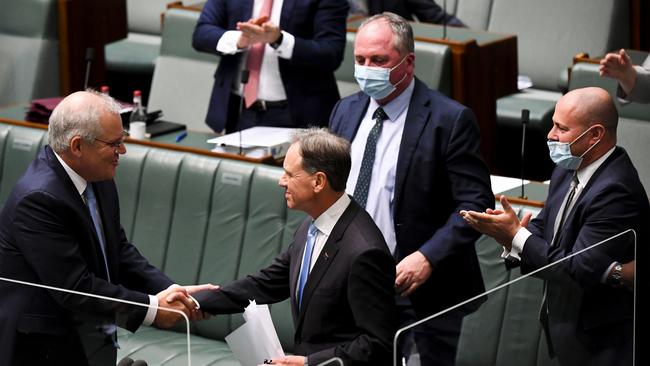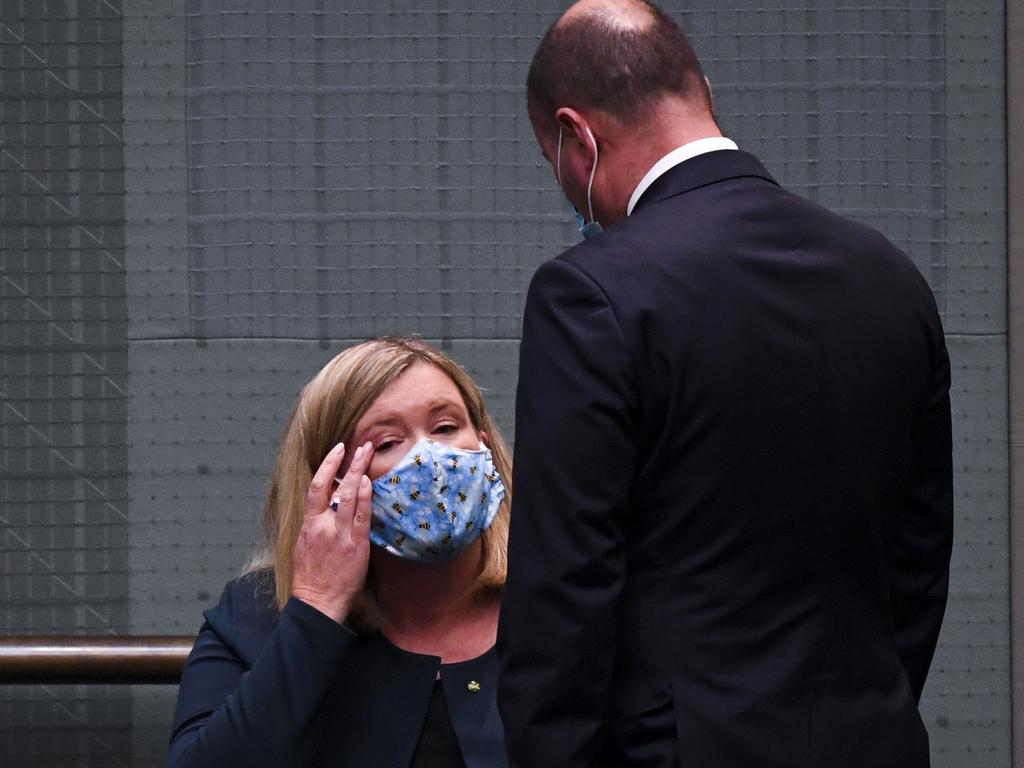Election storm brews for the Coalition
Labor goes into the summer break with its tail up as the election battle begins.

Anthony Albanese has all the politics running in his direction at the end of the parliamentary year and going into the 2022 federal election campaign.
After two weeks of parliamentary confusion and disruption as the Coalition faced an ascendant Labor opposition, there was no appetite or incentive for extended sittings next year as the government opted for just two weeks of parliament in February before the scheduled March 29 budget.
There is anger and frustration with Scott Morrison, the Coalition is divided, there’s disunity in the ranks as MPs and senators rebel, retirements of serving MPs are rising, the left and right of the Liberal Party are both unhappy with the prime minister, and the ALP is ahead in all the polls.
There are now 11 Coalition MPs retiring at the election, including the highly successful Health Minister Greg Hunt, when local politics, identity and grassroots connections are going to count much more than in previous polls.
But, with an election possible in March and inevitable by May, there is one essential element that is still missing for a Labor return to government next year: a mood for change.
A lack of a real agenda, ministerial resignations, sexual harassment allegations, attacks on Morrison’s credibility, divisive polarisation on issues such as climate change and religious freedom, defections and parliamentary chaos have all damaged the government’s standing and helped Labor enormously.
Coupled with Albanese’s best discipline in his political life, as he faces the greatest challenge in his career and an existential threat to Labor’s modern relevance, Morrison is in trouble and the Coalition’s in strife.

For Morrison, a second electoral win against the odds will be a vindication of centrist “quiet Australians” policies, while for Albanese a first-up loss as Opposition Leader, the fourth in a row for the ALP, would finish him and fundamentally question Labor’s relevance to the 21st century.
At this stage of the political cycle there is no secure pathway to a Coalition victory, but nor is there the certainty of a Labor win.
The brightest outlook for the Coalition is a minority government, while a Labor-Greens minority government is a potential outcome as clear majorities on either side are difficult to predict.
The reason for this lack of certainty so late in a three-year term is simply the Covid-19 global pandemic. The focus of people’s lives has changed in a once-in-a-century event which has kept millions locked into their states, cities and even homes, where fear of infection for themselves or family has been paramount, job security has taken precedence over wage rises, and resentment, simultaneously, at government intervention and failure to act, has festered.
Power balances changed between state and federal governments and in response to the extent of coronavirus infections and deaths.
MPs and strategists recognise the change of attitude on the ground and describe the states as being “different countries”, with further huge internal differences within them between regions and cities.
This fracturing of government power and popular allegiance means that unlike the sense of “It’s Time” for change in 1972, the massive counter-reaction to the Whitlam government in 1975, the surety of the end of the Fraser government in 1983, the inevitability of the John Howard win in 1996, and the sense of the “new” appeal of Kevin Rudd in 2007 or even the Tony Abbott victory from opposition in 2013, there is no welling sense for change, yet.
Instead there is an overwhelmingly, almost inchoate, wish for a return to normal or the new normal or even the near normal, and that means there hasn’t been a focus on the intricacies of politics and there probably won’t be until next year when voters will be forced to look at the options.
National polls have Labor in front on a two-party preferred basis. Redistributions have handed the ALP “nominal” gains in Victoria. And defections have reduced Morrison to a minority government already. The Coalition must win seats just to hold power.
Both sides have clear political strategies. Albanese wants to make Labor a small target on policy. He waited as long as he could before finally declaring on Friday a 2030 carbon emissions reduction target of 43 per cent, compared to Morrison’s 26-28 per cent and a forecast 35 per cent cut, and now has to explain how it will be achieved.
While Morrison has been battling within the Coalition to achieve a commitment to net-zero carbon emissions by 2050, Albanese has been holding fire and waited until parliament rose.
Albanese’s other main strategy is to drag down Morrison personally as a leader and argue that the response to Covid-19 was botched and there were more deaths and greater economic damage because of vaccine and quarantine failures.

Labor relentlessly claims Morrison won’t take responsibility, has “difficulty with the truth”, shifts blame, doesn’t believe in anything – including fighting climate change – doesn’t care about women, and approves of dodgy funding.
As the Coalition’s “good luck charm” and miracle election winner, Morrison is Labor’s priority target. It hopes that generally disillusioned voters will accept the narrative and use it as an excuse to vote against the Coalition.
Albanese asked Morrison on Thursday if he could confirm “that this fortnight government members and senators have crossed the floor on multiple issues; the chair of the privileges committee resigned over a report on the member for Pearce, who also resigned; and the Prime Minister was forced to abandon his voter suppression bill? Hasn’t the Morrison-Joyce government lost the ability to govern?”
Morrison’s response encapsulated his own strategy of portraying Albanese as weak and inexperienced, without the capability to be prime minister and lacking in substance.
“No is the short answer to that question,” Morrison said.
“The Coalition government continues to focus on the issues the Australian people have foremost in the front of their minds. While the Labor Party want to focus on the parliamentary games of Canberra and what goes on in the bubble of this place, my government, our government, will focus very firmly on what is happening in the homes and the communities all around this country.
“They are concerned about their health and their wellbeing as we come through one of the largest and most significant pandemics in 100 years over the course of this year,” he said in direct reference to impact of the coronavirus on the national psychology.
He also set out the heart of the Coalition’s campaign for next year with the budget, vaccine success and economic recovery to the fore.
“The Labor Party opposition prove day in and day out that they’re more interested in the slurs, sledges and trivialities of politics and coming in here and showboating around than focusing on the issues that are really demanding the attention of the Australian people that our government are focused on – getting them into jobs, keeping them safe, driving our manufacturing industries forward, getting electricity prices down, and standing up to those who would seek to coerce Australia and threaten the interests of Australians.”
The key to Morrison’s success in this campaign will be whether people, angry and anxious as they are, decide the Coalition did the best it could during the global pandemic to save lives and jobs with top global rankings in vaccines and economic recovery, or judge it a failure and reason to vote against the government.
There will need to be some new, perhaps modest, policy initiative to offer as progress in 2022 and 2023 beyond simply doing a good job in 2020 and 2021.
The Coalition has to be careful not to provide an excuse for its supporters to change their vote but equally it has to provide a reason for them to stay.
Morrison still has the advantage of Albanese as the preferred prime minister which is expressing itself popularly with people simply saying they don’t like, trust or believe Morrison anymore but finishes with a query as to whether Albanese would be better.
This sentiment hasn’t yet reached a tipping point, but it can – and can do so quickly if a mood for change develops.
For Albanese, there is still the stubbornly low primary vote in the polls and a difficulty in getting close to being seen as a better leader than Morrison. As well, the commitment to a small target on policy means he is captive to people deciding the Covid-19 response has been a failure and the danger his attacks on Morrison entrench an image of him being negative.
Labor’s election plan is the exact opposite of Bill Shorten’s in 2019, which went close, but without a mood for change, appearing negative and banking on a judgment of failure it may need much more in early 2022 to succeed and not just wait for Morrison to fail.
More Coverage
Read related topics:Anthony Albanese





